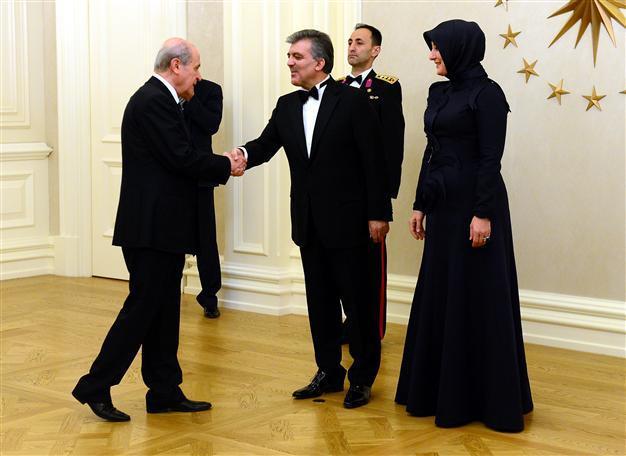Nationalist party head urges CHP to be 'understanding' over headscarved deputies
ANKARA

Nationalist Movement Party (MHP) leader Devlet Bahçeli shakes hand with President Gül and his wife during the reception at the Presidential Palace in Ankara, Oct. 29. AA photo
Nationalist Movement Party (MHP) leader Devlet Bahçeli has urged the main opposition Republican People's Party (CHP) to be "understanding" if female ruling party lawmakers choose to wear headscarves at Parliament.Bahçeli told reporters during the reception at the Presidential Palace in Ankara marking the Republic Day that the MHP would give a "respectful reception" to headscarved deputies at Parliament. "The CHP should also be understanding," he added.
Ruling Justice and Development Party (AKP) lawmakers Sevde Beyazıt Kaçar, Gülay Samancı and Nurcan Dalbudak have all separately announced that they will soon attend General Assembly meetings at Parliament wearing headscarves. All three are among the AKP's female deputies who recently performed the annual Hajj.
The abolition of the headscarf ban has caused a rift inside the main opposition, with a hard-line wing reportedly pushing party leaders to formulate a common policy against the entry of lawmakers wearing headscarves.
The CHP made contributions too: President Gül
For his part, President Abdullah Gül emphasized that the CHP had also made contributions paving the way for the recent legislative change. "This issue was once seen as a taboo. We should see that they [the CHP] also made a constructive contribution," Gül said during the reception that he himself hosted, adding that there were no more legal obstacles for the attendance of headscarved deputies at parliamentary sessions.
"As far as I know, the parliamentary speaker says Parliament's charter does not contain any obstacles. In the end, this is an issue that politics will [solve]," the president told reporters.
Gül also expressed support for a more Anglo-Saxon interpretation of secularism. "It is pleasing to see that we are moving away from a [restrictive] understanding of secularism, to a come to a more Western one, like in the United States or in Britain," he said.
















